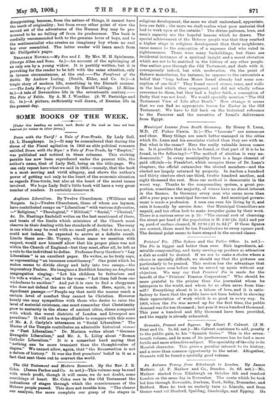Anglican Liberalism. By Twelve Churchmen. (Williams and Norgate. 5s.)—Twelve Churchmen,
three of whom are laymen, have contributed essays on "Liberalism" with various differentiae, —"Religious," "Theological," "Social," "Clerical," dc. Dr. Hastings Rashdall writes on the last mentioned of these, and treats of the limits which ministers of the Church must observe in their dealing with her standards of doctrine. The essay is one which may be read with no small profit ; but it does not, it could not indeed, be expected to arrive at a definite result. Limits there are—Mr. Voysey, whose name we mention with respect, would now himself allow that his proper place was not within the Church of England—but they must, after all, be left as a rule to the individual to define. Professor Percy Gardner's "Lay Liberalism" is an excellent paper. He writes, as he truly says, as representing "an immense constituency." One point which he makes seems to divide clergy and laity into two camps,—the imprecatory Psalms. He imagines a Buddhist hearing an Anglican congregation singing: "Let his children be fatherless and his wife a widow," or, what is far worse: "Let them fall front one wickedness to another." And yet it is rare to find a clergyman who does not defend the use of these words. Here, again, is a significant passage:—" People say that until the masses reach a certain level of comfort they cannot be Christian. However keenly one may sympathise with those who desiro to raise the level of material existence, one must remember that Christianity grew to maturity in the slums of ancient cities, slams compared with which the worst districts of London and Liverpool are paradises." It will not be unprofitable to compare with this some of Mr. A. J. Carlyle's utterances in "Social Liberalism." The Master of the Temple contributes an admirable historical résumé on "Past Liberalism." Dr. Morison writes about "German Evangelic Liberalism," and Mr. A. L. Lilley about "Roman Catholic Liberalism." It is a somewhat hard saying that "nothing can be more transient than the thought-value of dogma." We cannot allow, again. that "the Resurrection is not a datum of history." It was the first preachers' belief in it as a fact that mint them out to convert the world.






































 Previous page
Previous page